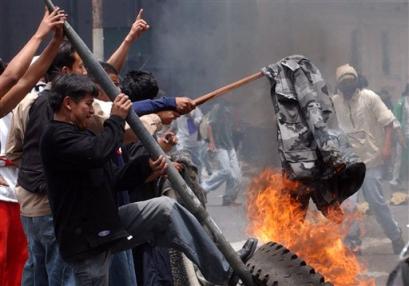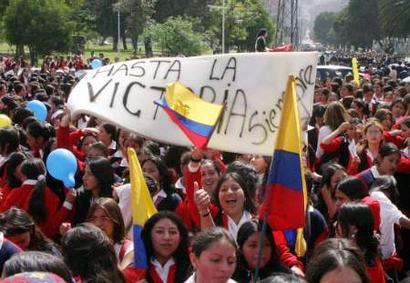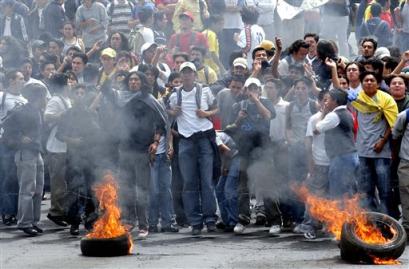CUENCA, ECUADOR – By a unanimous vote Ecuador's lawmakers removed President Lucio Gutierrez from office Wednesday and replaced him with Vice President Alfredo Palacio, following days of intensifying street protests.
While the focus of media attention has been on the capital city of Quito, the southern city of Cuenca has been in open rebellion against its former president for the past week. The discontent had been simmering for some time but in the weeks and days before the ouster of Gutierrez it reached a boiling point. Daily, students manned street blockades and fought pitched battles with police over control of the streets while across town the main park overflowed every night with a diverse array of people who had come to protest the president and government.

April 13th was a general strike in both the cities of Cuenca and Quito. After that the anti-government rebellion steadily increased. The mayors of Ecuador's three largest cities – Quito, Guayaquil, and Cuenca – as well as the Vice President denounced President Gutierrez, who was the central enemy of the dissidents.
The street blockades near the University of Cuenca began a week before the general strike and were at first very small, but the students and their allies grew to resemble something more like a rebel army. The discontent in this city has been great for some time but only after the general strike did masses of people gather in peaceful protest on a daily basis. The Saturday after the strike, a prominent local politician called for demonstrations against President Lucio Gutierrez that evening, both in the main park and at the soccer stadium. Thousands came, and continued to come each night until Gutierrez was removed from power. Every night the streets echoed with the sound of car horns sounded in support of the demonstrators.
The students commandeered city buses at will and forced them to park across the road to guard against police attack. They milled around in the street for a few hundred yards in territory they controlled while perhaps a hundred feet from the edge of this stood a tight line of riot police. The police occasionally made a concentrated attack and with the aid of a tank and large amounts of tear gas, pushed the protesters into the University and freed the buses. Within minutes the students would take another bus and occupy the same area they were just driven from. Most wore shirts over their face and had either a Molotov cocktail or rock in hand ready to throw during the next tank attack, which was much more frequent. Some wore thick gloves on their hands and threw the burning tear gas back at the police during the larger attacks. All were very committed to their cause.
When asked why they were here fighting the police, most gave long passionate explanations. Their fight extends far beyond the president. They were there to fight against capitalism and Ecuador's potentional inclusion in the Free Trade Area of Americas (FTAA) as much as they were to oust the president. There is a strong Socialist influence at the University and a powerful anti-American undercurrent permeates the streets around it.
At the main square there were many families present. When asked a number of parents gave their children as the reason they were in attendance, saying they wanted them to have a better future and a better government, few people singled out Gutierrez.
The two groups disagreed with each others tactics but had a common goal and agreed that they are each helping each other reach that.
The night before Gutierrez was removed from power the students took commandeered buses from the street blockades near the University to the main square just as the other protesters were beginning to arrive.
There was a large military presence in the square but when the demonstrators arrived they quietly walked away. The police fired tear gas to disperse the crowd causing the group to splinter into many.
These smaller groups, pushed away by more tear gas roamed the dark streets in search of each other. Many city residents who were in the area were absorbed by the growing roving bands. Protesters snaked through the center of the city the next morning at will, the police did not interfere.
The entire city was in rebellion. Now that Gutierrez is gone the streets are filled with celebration rather then discontent but it is uncertain how long this will last. The people who were in the streets here may not be satisfied with just a new face that will likely soon grow to look the same. They want something much more drastic, and they have the momentum. When the mayor and some other politicians came in support of a recent demonstration here, the chant quickly changed to – all politicians out – and the group was forced to the outskirts.

